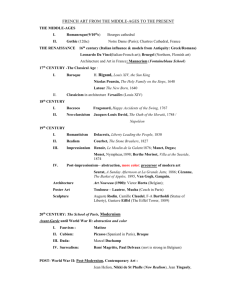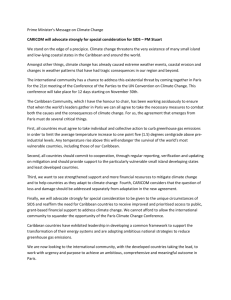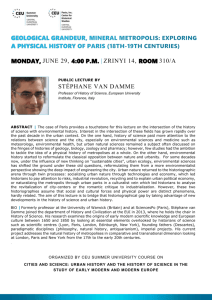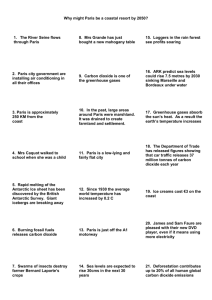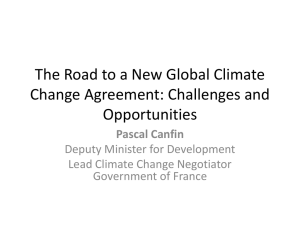Thoughts on Day One
advertisement
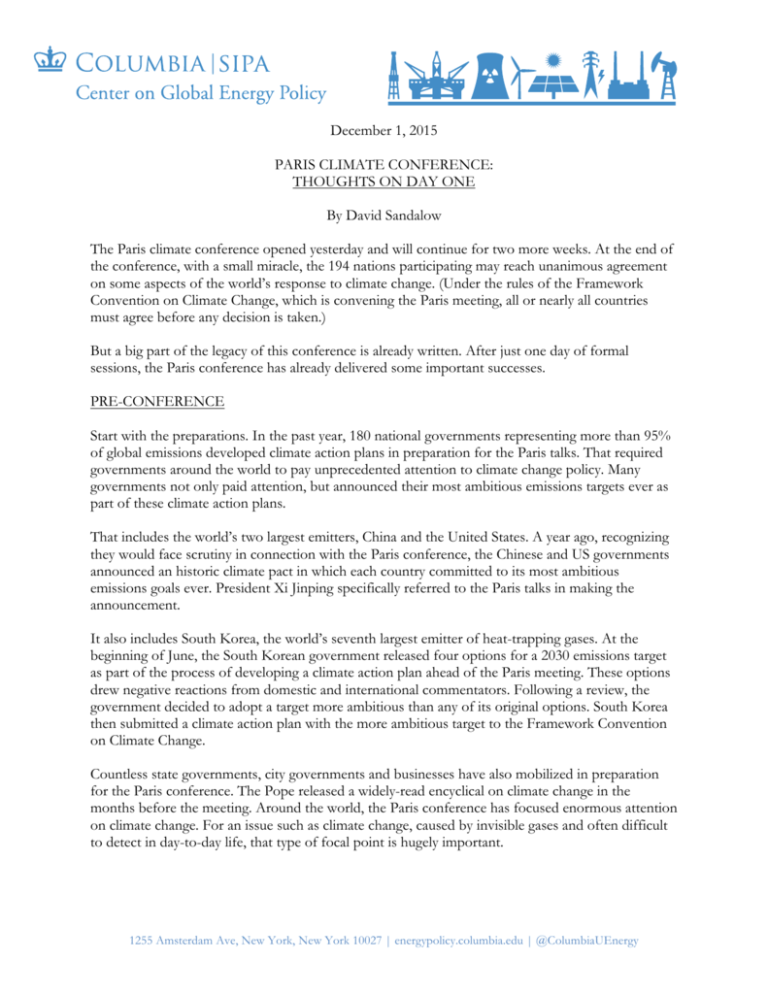
December 1, 2015 PARIS CLIMATE CONFERENCE: THOUGHTS ON DAY ONE By David Sandalow The Paris climate conference opened yesterday and will continue for two more weeks. At the end of the conference, with a small miracle, the 194 nations participating may reach unanimous agreement on some aspects of the world’s response to climate change. (Under the rules of the Framework Convention on Climate Change, which is convening the Paris meeting, all or nearly all countries must agree before any decision is taken.) But a big part of the legacy of this conference is already written. After just one day of formal sessions, the Paris conference has already delivered some important successes. PRE-CONFERENCE Start with the preparations. In the past year, 180 national governments representing more than 95% of global emissions developed climate action plans in preparation for the Paris talks. That required governments around the world to pay unprecedented attention to climate change policy. Many governments not only paid attention, but announced their most ambitious emissions targets ever as part of these climate action plans. That includes the world’s two largest emitters, China and the United States. A year ago, recognizing they would face scrutiny in connection with the Paris conference, the Chinese and US governments announced an historic climate pact in which each country committed to its most ambitious emissions goals ever. President Xi Jinping specifically referred to the Paris talks in making the announcement. It also includes South Korea, the world’s seventh largest emitter of heat-trapping gases. At the beginning of June, the South Korean government released four options for a 2030 emissions target as part of the process of developing a climate action plan ahead of the Paris meeting. These options drew negative reactions from domestic and international commentators. Following a review, the government decided to adopt a target more ambitious than any of its original options. South Korea then submitted a climate action plan with the more ambitious target to the Framework Convention on Climate Change. Countless state governments, city governments and businesses have also mobilized in preparation for the Paris conference. The Pope released a widely-read encyclical on climate change in the months before the meeting. Around the world, the Paris conference has focused enormous attention on climate change. For an issue such as climate change, caused by invisible gases and often difficult to detect in day-to-day life, that type of focal point is hugely important. 1255 Amsterdam Ave, New York, New York 10027 | energypolicy.columbia.edu | @ColumbiaUEnergy OPENING DAY The Paris conference had a big opening day. More than 150 heads of state showed up -- the largest gathering of heads of state ever outside New York. President Obama spoke, saying “the United States of America not only recognizes our role in creating this problem, we embrace our responsibility to do something about it.” President Xi Jinping spoke, saying pledges to limit emissions will “require strenuous efforts, but we have confidence and resolve to fulfill our commitments.” Along with many other leaders, they spoke eloquently about both climate change and terrorist threats. But more important than the huge number of world leaders were twin announcements on clean energy innovation. First, President Obama and 19 other heads of state announced Mission Innovation -- a joint commitment to double government funding for research, development and deployment of clean energy technologies in five years. Participants include the United States, China, Japan, Germany, the United Kingdom, the United Arab Emirates, Mexico and many others. If all governments follow through on their pledges, Mission Innovation will generate tens of billions more dollars each year for early stage research in clean energy technologies. Second, Bill Gates and 27 other business leaders announced plans to invest billions of dollars of new capital into affordable, zero-carbon energy technologies, in an initiative they call the Breakthrough Energy Coalition. Participants include US, British, Indian, Chinese, Nigerian, South African, French, German, Japanese and Saudi business leaders. The group says it will form a “network of private capital” to accelerate the transition to a clean energy future. Its website calls for “a different kind of private investor with a long term commitment to new technologies who is willing to put truly patient flexible risk capital to work.” These announcements could have significant impacts. Clean energy is the key to solving global warming. (Roughly two-thirds of heat-trapping gases come from the energy sector.) Although many questions remain, especially about the private sector initiative, these announcements send some signals. First, the clean energy sector will see significant new resources in the years ahead. Second, funding for clean energy may be available on more favorable terms than in years past. For laboratory researchers, entrepreneurs, project developers and countless other professionals, opportunities in clean energy will continue to grow. THE NEGOTIATIONS AHEAD For the remainder of the conference, negotiators will be grappling with a Rubik’s cube of complex issues. In the best circumstance they will reach agreement on many of them and, in less than two weeks, announce a Paris Agreement. Yet the odds against significant steps forward are high. The Framework Convention on Climate Change is not a strong institution. It lacks enforcement powers and is hobbled by rules of procedure that require all or almost all countries to agree before a decision is reached. That means that any decision taken is, by definition, a least-common-denominator outcome. 1255 Amsterdam Ave, New York, New York 10027 | energypolicy.columbia.edu | @ColumbiaUEnergy Against this backdrop, the Framework Convention leadership and French Presidency have played a weak hand brilliantly, using the tools at their disposal to shape a conference that has already delivered important results. For this they and many others deserve enormous credit. Of course, much more is needed. Even if all the climate action plans submitted by national governments are fully implemented, the world will still face dangerous climate change. We must find better ways to mobilize capital not just for clean energy innovation, but also to help the poorest and most vulnerable adapt to climate change. Of course no single meeting can solve a problem as far-reaching as climate change. In the weeks ahead, media coverage of the Paris conference will increasingly focus on once obscure issues such as procedures for reviewing national climate action plans. Reaching agreement on these issues would inject additional momentum into global efforts to fight climate change. But after just one day of formal sessions, the Paris conference has already delivered some important successes. David Sandalow, Inaugural Fellow at the Center on Global Energy Policy at Columbia University, has served in senior positions at the White House, State Department and US Department of Energy. He was a member of the US delegations to the Kyoto and Copenhagen conferences. 1255 Amsterdam Ave, New York, New York 10027 | energypolicy.columbia.edu | @ColumbiaUEnergy

